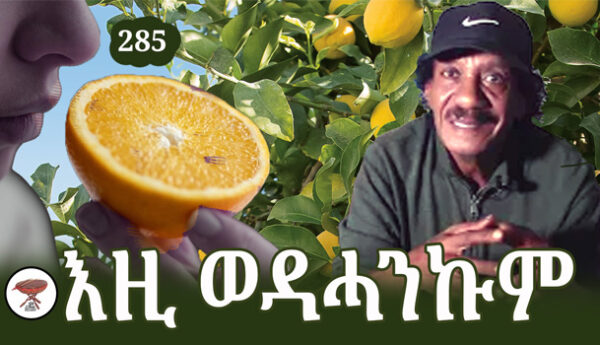Shum Gedede & The Goatskin
![]()
This article is first published on Sep. 19, 2005 when the current trend of degrading and belittling the Eritrean struggle was unthinkable. I thought of bringing it up again to help us reflect. Its TIGRINYA TRANSLATION IS HERE ሹም ገደደን ቆርበትን (ሳልሕ “ቃዲ” ጆሃር)::
This story is dedicated to the top brass of the Eritrean Army; it is by no means intended for the victims, the forcefully conscripted.
A man had an eye on a married beautiful young woman. He devised a cunningly evil way to get to her. One day, he carried a goatskin (hawett) full of butter and pretending to be a salesman knocked on the woman’s house. Her husband opened the door to find the ‘salesman’ offering his product for an unbelievably cheap price. The husband was fooled by the bargain price: he thought it was a good deal. He asked to smell and taste the butter; the con artist said, ‘sure’, and asked the husband to hold the goatskin while he untied the knot on the goatskin–the neck that secured the butter from spilling out. Once the husband held the heavy goatskin with both hands, the man untied the skin and walked inside the house and started to make moves on the wife. The husband, instead of throwing the goatskin and rushing to protect his wife, being the coward that he is, started to curse and threaten and shout without leaving his place: ‘if I was not worried the butter would spill, I would kill you!’ He then boasted to his crying wife: tell him to come and receive his butter goatskin from me, I will see if he is a man when my two hands are free!
Ata Shum Gedede
ata shum gedede shum gedede
ab r’som kof ilka messka ste
That was a folk song from a distant past residing in a faint memory. This time, the Shum is not holding a cup of Mess but a bottle of scotch; he is not only sitting on our heads, but also walking over our bodies with his boots- and that is my beef with the top brass of the army, especially those who like to be called Yekaalo, veterans who fought for the liberation of Eritrea and “for the freedom of its people”, veterans who sloganeered enough “Awet Nhafash” and “AlNasr Lil Jamaheer”.
Being proud of our struggle and of our sacrifices is all in the past; it is a history that we hold dearly. However, being subservient to the combatants of yesteryears and being apologetic for the cruelties they commit is betrayal to the ideals of the whole Eritrean struggle. Injustice and oppression in Eritrea is not being committed in a vacuum.
The majority of the Eritrean armed forces are conscripts who wield no power. They are purposely kept in the trenches by the PFDJ regime that wishes them to age and wither away after their spirit and willpower has been broken. Meanwhile, injustice is perpetually inflicted on the Eritrean people by elements within the top brass of the PFDJ. The rest of our “veterans” are holding the goatskin while Eritrea is being raped.
Today, very few remain true to their history and are trying to do something about the situation in Eritrea. These are the hope of the nation. Still, a few have become passive enablers of oppression. Others are as criminal as the next killer within the regime. Still others are typical living-dead with no conscience. Shame! Those who are supposed to be the muscle of the people should not be afraid to drop the goatskin and spill the butter to save the nation. No Eritrean worth his salt should be an apprentice of oppression that mistreats his people—a tentacle of an oppressive regime should not be mistaken for a servant of a nation. Uniformed or not, the day of reckoning is approaching fast.
Many of our “revered” tegadelti are hopping from one bar to another nightclub and enjoying perks and authority at the expense of the citizen’s liberties. They are the peripheries of the oppressive clique: ruthless soldiers and privates, spying on their countrymen, beating and humiliating the whole populace. The stick has become the talking tool of the PFDJ—guess who is carrying that stick? Your average warsay ordered by your average Yekaalo. Those few rotten potatoes are spoiling everything while the honest citizens, are considered helpless, enslaved, abused, terrorized, jailed and killed. In such a situation, an uprising is the natural outcome; and it is certain the peoples’ anger will explode as the fire in the belly goes one little tiny notch up. Can we rule out an all out violence? Then, are we going to look for the West or the UN to deploy more peacekeepers and solve our problems for us? Don’t we need to grow up and solve our problems by ourselves?
A few months ago Isaias was fuming and ranting to re-ignite the border war with Ethiopia. The army was nervous contemplating the damage. Only one Eritrean army general defied Isaias by telling him: “I disagree…we don’t need war and we are not prepared for it”. According to foreign source stationed in the buffer zone the general’s defiance saved the day and stopped another tragedy.
There are enough indications to suggest that there are a few senior officers of the army who are apprehensive of the situation at home. Some are openly admitting that the PFDJ has become a local version of previous foreign oppression. But this is not enough. Such intents should come out to the open and move a step further to stop the bleeding of our country. We should not settle for an empty “moral victory.” Primarily, the responsibilities of solving Eritrea’s problems lie square on the laps of those who brought about the oppression. And a rule applies, you broke it, you fix it! And we can learn from Algeria, a country whose psyche was totally defined by its struggle against French colonialism.
After independence of the country, the Algerian Liberation Front (ALF) built the image of Algeria on ‘the land of one-million martyrs’ slogan. ALF took power and governed Algeria on single party dictatorship for many years. It behaved exactly like the PFDJ is behaving. After the euphoric years of patience, the lack of good governance caused the revulsion of the population (especially the young) against anything related to the period of the armed struggle and the result it brought about. There were even incidents when Algerians desecrated the graveyards of the soldiers who fell during the struggle- unthinkable to happen in the sixties and seventies. In the eighties and nineties, the oppressive ALF led the country into total chaos that claimed thousands of lives. If the PFDJ continues to rule unabated, we might lose the value of our legacy, the legacy of the struggle era for which we paid dearly.
Bahta Hagos Or Awate Were Not Opposition
Where there is oppression, there is resistance. There is no opposition under an authoritarian regime simply because there is no political room – but there is Resistance.
When free men are enslaved and humiliated by dictators, the natural instinct of the oppressed is to resist – and to struggle to bring the oppression to an end. But not all men take the challenge. That is why there are heroes.
What made Bahta Hagos rebel against the Italians was the same reason that made Hamid Awate raise his gun against the Ethiopians: the quest of freedom. They died for a right cause, free soldiers of freedom whose spirit no one could enslave. They were not an opposition; they were forces of a dignified resistance.
Since ancient times, great Eritrean heroes gave their lives for freedom; their legacy and sacrifices define the Eritrean psyche to this day. An observer of Eritrean affairs might wonder: how could a brave defiant nation stand such oppression? It is the shock. It is the shock of being betrayed by your own sons and daughters. However, we have now crossed the shock line as well as the after-shock line. It is once more a time to prove what Eritrea is all about- never giving up the fight in pursuit of pride and dignity. The fertile Eritrean womb produced an abundance of heroes and heroines; and the silence of Eritreans is very misleading; it is sign of a building pressure that explodes wildly. Obviously, the Eritrean resistance is shifting gear: from the timid defensive strategy to an offensive one.
Though in a modest sotto-voce, the clandestine nature of the internal resistance is building inside Eritrea. It is time that both internal and external resistance understood that they have to provide sound and solid leadership, one that should prove its commitment to democratic values, openness, far-sighted economic and social goals that embrace modernity. It should show a dedication to carry Eritrea to the now-far realm of globalization. This is a time for an optimistic offensive strategy.
Resistance And Violence
There are two acts of violence raging in our country. First, we have to come to terms with a fact: though it is not full-fledged, government forces and resistance forces have been clashing all the time. Eritreans have been killing each other for too long, and many lives are being lost. That is between the resistance forces and the government forces. Secondly, and to a far larger extent, we have a violent government that has unleashed its merciless brutality and violence against the Eritrean people for far too long. That is what we are dealing with.
Many individuals, and the ELF, strongly pushed for a national reconciliation for years. The arrogant PFDJ considered the calls a sign of weakness and a laughing material. In his notorious remark, Abdella Jabir a PFDJ leader belittled the opposition and characterized it as “nefer-neferen”, one or two persons. He gloatingly wondered how the all-glorious PFDJ is expected to talk to, nefer-neferen. That was (and is) their vision of reconciliation. The “nefer-neferen” remark became a catchword by the PFDJ and its supporters to undermine the calls for reconciliation. I am one of those who were continuously ridiculed for advocating reconciliation. I gave up on the PFDJ and concluded that any future violence lies on the laps of the PFDJ – for almost a decade now, I am being proven right every passing day.
Being angry, reacting to injustice, and struggling to reclaim a God-given right, is not only human, it is noble. People who are denied the means of recourse to redress or rectify injustice opt for the use of power as a last resort. Again, it is human. And the result is bloodletting. But how can we stop the bleeding of an already exhausted nation? First we need to identify the source of injustice and hindrance to reconciliation. That patriotic Eritreans have done: it is the PFDJ. Second, the PFDJ needs to be uprooted.
Some people would rather wait indefinitely to get their rights. It is their choice. Others are proactive and chose a means to reclaim their rights, it is their choice. With the exception of a very few dedicated activists, the attitude of those who claim to be exponents of a non-violent struggle has practically been ‘wait and see’. The argument that the PFDJ-will-fall-on-its-own-weight is not productive. Those who are doing nothing do not have a moral authority to dictate their preferred mode of struggle on the whole resistance movement. Their only choice is to be active on the non-violent struggle and prove to everybody that they can bring about change so that those who have already carried arms would be convinced to throw their guns away.
It is a sad reality that Eritreans are killing each other. And any sane person knows when two parties carry guns, no one volunteers to throw their guns without any precondition, a ceasefire agreement or reconciliation. It would be more productive if our do-nothing activists stopped deafening us with their condemnations and found a solution instead.
I don’t think there is an Eritrean who doesn’t know that Eritrea is composed of Muslims and Christians; and no followers of one faith can force their values on the others. As has been the case for centuries, we have to strongly safeguard our nation’s peaceful coexistence. Fanatics are trying our unity, and the PFDJ is sustaining an agreeable environment for such festering wounds. If we fail to defend our unity and create a peaceful atmosphere for just political governance, we are doomed. It is time for resistance to save Eritrea.




Awate Forum